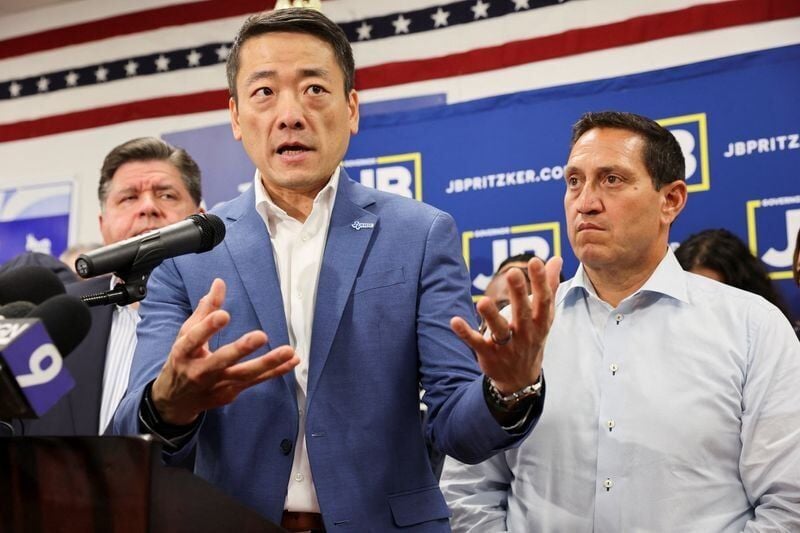COLUMN: A definition and defense of political moderation

Texas State Rep. Gene Wu speaks near Texas State Rep. Trey Martinez and Illinois Gov. J.B. Pritzker as Democratic lawmakers from Texas hold a news conference, after leaving their state to deny Republicans the quorum needed to redraw the state’s 38 congressional districts, in Carol Stream, Ill., Sunday.
REUTERS
A dozen or more years ago, a media colleague paid me the compliment of calling me, “Colorado’s most radical moderate.” Thank you for those words, David Kopel.
As both parties have moved toward their extremities and the political noise machine exists on constant overdrive, moderation or centrism often seem endangered qualities.
Any Republican not fully, enthusiastically, unreservedly on board with Donald Trump’s MAGA movement is regarded as a RINO for “Republican in Name Only.” On the other side, any Democrat who still adheres to some marketplace principles and seeks the slightest common ground across the aisle is labeled a “squish” or an “appeaser.”
Just look where the energy resides in each party. Any Republican who crosses the President flirts with dead-man-walking status. John McCain is deceased; Ben Sasse, Mitt Romney, Jeff Flake, and Bob Corker departed the scene; and Marco Rubio, among plentiful others, has been thoroughly co-opted.
Colorado’s own Ken Buck, once a popular State Republican Party chair, left his congressional office ostracized by his own team.
Among Democrats, Bernie Sanders and Alexandria Ocasio-Cortez pack arenas while Zohran Mamdani is the newest heartthrob. Barack Obama is derided in left-wing circles as a “bridge-builder” (perish the thought). Joe Manchin, a Democrat with working-class, blue-collar appeal (remember when such a species roamed the Earth) left to jeers from progressive sorts who preferred a Republican hold that Senate seat than a Democrat of moderate mien.
That is the lay of the land. For years, my writing ran under the heading of “Down the Middle.” Even as I often joke that the only thing found these days in the middle of the political road is a dead armadillo.
Given the vanishing of moderation and bipartisanship, let’s explore what such ideas mean.
First, some words as to what moderation is not: Decidedly, it is not some mushy, supple, content-free, milquetoast middle ground devoid of principle or ideology. It need not be wishy-washy. It does not eschew strong convictions and viewpoints.
Regularly, when I express a stout view or take a side on a particular issue, I am criticized as somehow violating my centrist reputation. That is a product of a false expectation.
For me, at least, the claim of moderate status means evaluating issues on their merits, not based on how it might advantage this side or the other.
It involves understanding and respecting contrary arguments and positions. A piece of that is to put oneself in the shoes of those who think differently and try to appreciate how they perceive the question.
A moderate bearing means trying one’s best not to demonize those of a different mindset. As critical as I am of the character of our current president, I strive to not demean those who support and find voice in him. Many such fellow citizens have been ill-served and left behind by economic and cultural changes. They deserve understanding and most often respect, not further insult.
Occupying the middle ground in an overly divided time dictates that not every issue is Armageddon; not every media dust-up is worth the hype; and that finding commonality, even the now discredited idea of compromise, can be a worthy pursuit. It means using the entire palette of shades of gray, and not just painting in brilliant white and jet black.
Where true believers tend to have a very elastic code of conduct for those on their team versus those belonging to the hated opposition, moderates endeavor to hold both sides to account with a singular set of standards.
Further, moderates search for structural changes to augment centrist figures while unweighting noisier types on each extreme. Redistricting reform is a part of this. So are various proposals to diminish the power of insider-dominated, low-turnout nomination processes which magnify fringe voices and elevate the importance of general elections in which centrist voters hold more sway.
While moderation can be found in both parties, even if in retreat on both sides of the aisle, increasing numbers, including yours truly, are choosing to go without a party affiliation. For me, moderation is furthered by avoiding any fixed rooting interest for team-red or team-blue.
Just shy of 50 percent of Colorado voters share this unaffiliated registration, even as the share of true “independents” is far smaller.
In a concluding nutshell, my definition of moderation calls for embracing complexity while rejecting absolutes. That is the only path that suits these times.
Every week, I receive a rather equal volume of feedback accusing me of being a closet liberal or a conservative in disguise. So it goes. If partisans on both sides are displeased, I will take satisfaction in being somewhere in the vicinity of that moderate, centrist, middle ground.
Join me.
Eric Sondermann is a Colorado-based independent political commentator. He writes regularly for ColoradoPolitics and the Gazette newspapers. Reach him at EWS@EricSondermann.com; follow him at @EricSondermann
Eric Sondermann is a Colorado-based independent political commentator. He writes regularly for ColoradoPolitics and the Gazette newspapers. Reach him at EWS@EricSondermann.com; follow him at @EricSondermann




